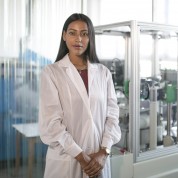Masters in Environmental Engineering & Technology (IMETE)

Kiranmai Uppuluri
Bio
Kiranmai Uppuluri was born in a tiny riverside village in southern India and grew up in the capital city of New Delhi. Born to a social worker and high school teacher in 1994, her passion for the environment developed at an early age of 17 while volunteering with Rural Center for Human Interests (RUCHI) in the Himalayan Mountains. At RUCHI, she led international teams of volunteers to build community toilets and rain water harvesting tanks in a remote village. The recurring experiences and satisfaction of working for society and environment while pursuing a B. Sc. degree at University of Delhi, led to her choice of environment being the subject of her higher education. In 2015, she started an Erasmus Mundus M.Sc. Program at Ghent University, Belgium titled International Masters in Environmental Engineering & Technology (IMETE). At IMETE, Kiranmai developed a variety of skills in data analysis, risk/impact assessment, and air/soil/water system rocesses/contamination/remediation technologies. She researched the impact of temperature on dewaterability of sludge in anaerobic digestion of wastewater for her master dissertation and interned at CEZ Group in Prague as an internal auditor. After IMETE, she was the Environment Manager of Shuddhi NGO in New Delhi where she was responsible for planning and implementing environmental projects such as mass awareness of waste segregation, urban waste management models using green technologies, installment of bio-toilets in slums, organic-products factories for women and community clean-ups of public spaces. Kiranmai currently works as an early stage researcher at Institute of Electron Technology, Krakow for the AQUASENSE Project under Marie-Sklowdowska Curie Actions Innovative Training Networks, where her team is developing new sensor manufacturing technologies for improved water and food quality testing.
Qualification
Project
RP1: pH, DO, conductivity and temperature sensors (ESR1, ITE)
Appropriate pH and sufficient DO are necessary in high quality water and aqua food environment. The values of pH, DO, temperature, and conductivity are the most important indicators, and these can be linked to each other. For example, the DO content of water is controlled by the salinity (in turn influence of conductivity), temperature and the rates of oxygen accumulation/consumption. Due to the high important of these parameters, it is necessary to fabricate the sensors on a single platform to cross-check the performance. The sensing performance and selectivity of the sensors are strongly related to the materials used to develop the sensors. Hence, the ESR1 will investigate new nanostructured materials and carry out theoretical and experimental studies. The potentiometric pH and DO sensors will be integrated with resistive temperature and conductivity sensors and will be fabricated by screen printing.
Host Institute
Institute of Electron Technology, Krakow (Instytut Technologii Elektronowej)

